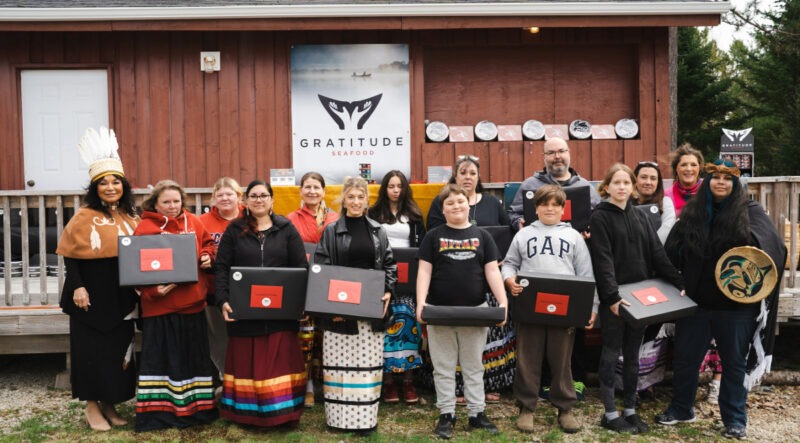First Nations share their aquaculture success stories
“When you purchase seafood from us, you join our journey and become part of the circle. Every purchase breathes new life into your community and ours.” Nuu-Chah-Nulth Seafood LP
By SeaWestNews
In the spirit of reconciliation, salmon farmers in British Columbia have built meaningful partnerships with First Nations that offer ownership, capacity building, as well as business and employment opportunities to their communities.
Today, 100 per cent of BC’s farmed salmon is raised in agreement with Rights Holder First Nations as they work with federal and provincial governments, and the salmon farming sector to build a responsible, realistic, and achievable transition of net-pen aquaculture in the province.
Salmon farming in BC directly and indirectly employs over 700 Indigenous people and provides $120 million in total annual direct and indirect economic benefits to First Nations, with $42 million going directly to Indigenous communities.
Taken as a whole, the entire sector generates over $1.142 billion of direct economic activity in BC annually supporting approximately 6,000 direct and indirect jobs.
Earlier this month, the Coalition of First Nations for Finfish Stewardship, released a comprehensive report, to reinforce the socio-economic importance of the sector and stressed that the future of salmon farming in BC must be determined by First Nations who want to farm fish in their traditional territories.
The ‘scientific textbook’ called Modern Salmon Farming in British Columbia: A Review, is also aimed at closing the knowledge gaps about the industry and counter the campaign of disinformation by anti-salmon farming opponents.
Here are four First Nations’ success stories in salmon farming as presented in the report;
Klemtu Spirit Smoked Fish – Kitasoo Xai’xais Nation
The Kitasoo Xai’xais began farming and processing salmon independently in their waters in the late 1980s raising coho salmon. When they struggled to be successful in their operations, they reached out to what is now Mowi Canada West, thereby forming the province’s first official Nation-company partnership in 1998.
Today, Mowi operates six salmon farms in Kitasoo Xai’xais territory with an average annual harvest of 5,000 tonnes of salmon.
The processing plant in Klemtu was recently converted to a smokehouse, and in December of 2021, Walmart Canada was announced as the first retailer of Klemtu Spirit Hot Smoked Atlantic Salmon, a newly launched seafood product produced by the Nation in partnership with Mowi.Over 50 per cent of the Kitasoo Xai’xais’ revenue derives from their salmon farming partnership, all while conserving over 52 per cent of their territory through their Great Bear Sea and Rainforest initiatives and their recent creation of an Indigenous marine protected conservation area (IMPCA).
“Our values ensure that the products we produce in our territory are done so in a way that minuses the impacts on the natural world and other species and does not harm the environment – Isaiah Robinson, Councillor Kitasoo Xai’xais First Nation.
Gratitude Seafood – Nuu-Chah-Nulth Seafood LP
The Nuu-chah-nulth-speaking people consist of 14 First Nations on the west coast of Vancouver Island. Of these 14 communities, five partnered together to create Nuu-chah-nulth Seafood LP, “a First Nation owned seafood enterprise.
Nuu-chah-nulth Seafood offers planning and management support to First Nations and their community members in various aspects of fisheries and aquaculture.
In 2015, Nuu-chah-nulth Seafood purchased St. Jean’s Cannery and Smokehouse in Nanaimo, which enabled partner Nations to benefit from owning Vancouver Island’s largest cannery and smokehouse.
Three percent of annual sales of Gratitude Seafood products go directly back into Nuu-chah-nulth communities, with 1.5 per cent going to restoring language and identity, and the other 1.5 per cent going to creating new seafood economic opportunities for First Nations.
“When you purchase seafood from us, you join our journey and become part of the circle. Every purchase breathes new life into your community and ours”
Gratitude Seafood, Nuu-chah-nulth Seafood LP.
James Walkus Fishing Company – Gwa’sala-‘Nakwaxda’xw
From humble beginnings with a single leaky boat, James Walkus of the Gwa’sala – ‘Nakwaxda’xw Nation built the multimillion-dollar fishing company, James Walkus Fishing Co.
However, when wild fish stocks began to decline, the company and its employees faced a dismal future. Walkus overcame this challenge by converting to aquaculture and forging a partnership with Mowi Canada West to provide supply and transport services.
Aquaculture now accounts for 60 per cent of Walkus’ business and provides jobs for 30 people on North Vancouver Island, many of whom are First Nations.
In 2014, Walkus launched a $9M farm-raised salmon transport boat – and
added a second $11M boat in 2018.
“The partnership has been tremendous We have First Nations people from our reserve working on these boats. Plus, many of them are working at the processing plant. It’s absolutely great for our people.” James Walkus, James Walkus Fishing Company.
Chief’s Pride Aquaculture Co. – Tlowitsis Nation
In 2021, the Tlowitsis Nation created a business called Chief’s Pride Aquaculture Co. (CPAC) and signed a three-year contract with Grieg Seafood BC to provide net-washing services to its three farms in Clio Channel off Johnstone Strait – part of the Tlowitsis’ traditional territory.
The farms were named by the Tlowitsis and are called Noo-la, Tsa -ya- and Wa- kwa, Kwak’wala for Big Brother, Little Sister, and Little Brother.
This contract with Grieg Seafood provides the Nation’s business, CPAC, with automated net-washing equipment, a skiff, a crane barge and, most recently, an accommodation barge in Clio Channel for its all-Indigenous employees.
The Nation also has its own Guardian Watchmen keeping an eye on salmon farming operations, contractors, and other ongoings in its marine space.
“As much as there seems to be controversy about the (salmon farms), we believe many First Nations should be looking at long-term relationships with salmon farming partners. There are only so many opportunities available, and most of the Nations have traditional territories adjacent to the inlet water…it only makes sense.” Councillor Thomas Smith, Tlowitsis Nation.
Image shows recipients of Gratitude Seafood’s Laptop for Learners giveback program, recognizing those working to restore traditional Indigenous culture and language. (CNW Group/Gratitude Seafood)

